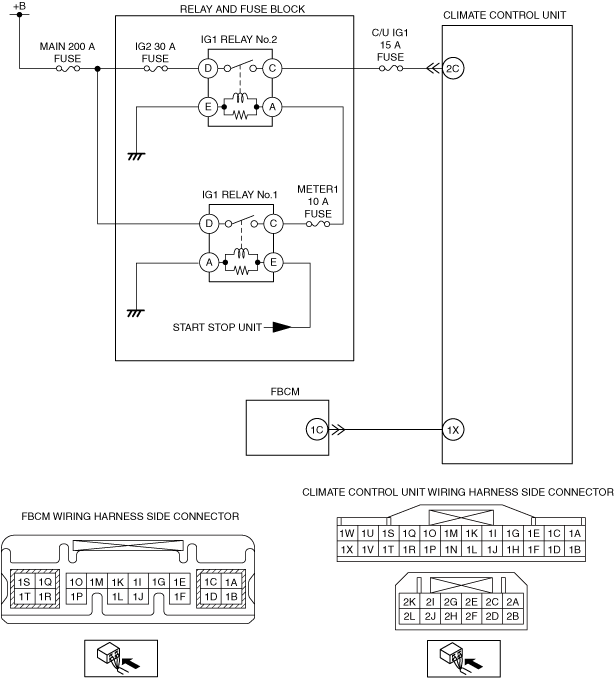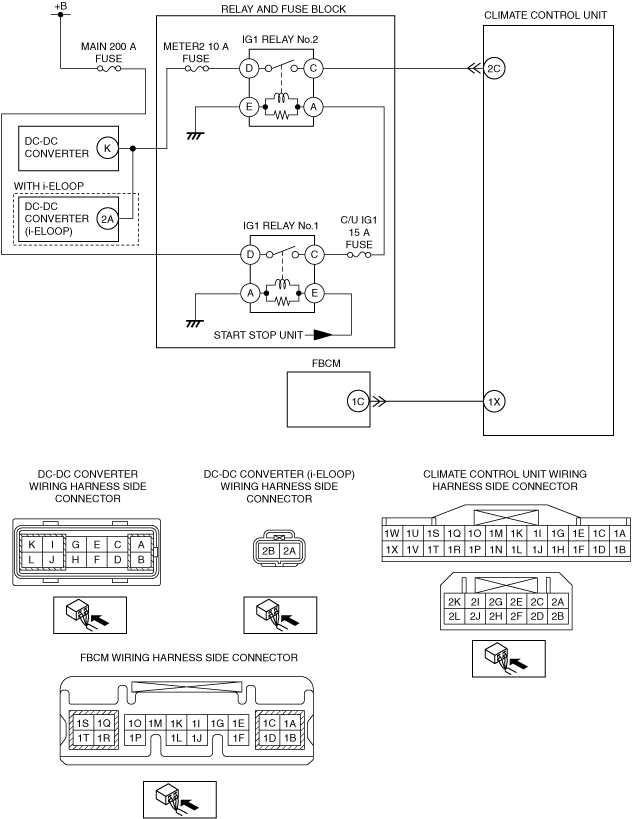|
1
|
INSPECT BATTERY
• Is the battery normal?
|
Yes
|
Go to the next step.
|
|
No
|
Replace or charge the battery.
Then go to Step 9.
|
|
2
|
INSPECT GENERATOR
• Is the battery normal?
|
Yes
|
Go to the next step.
|
|
No
|
Replace or charge the generator.
Then go to Step 9.
|
|
3
|
INSPECT FUSE
• Switch the ignition off.
• Disconnect the negative battery terminal.
• Remove the following fuses.
-
― C/U IG1 15 A fuse
― METER2 10 A fuse
• Are the fuses normal?
|
Yes
|
Install the all fuses, then go to the next step.
|
|
No
|
If the fuse is blown:
• Refer to the wiring diagram and verify whether or not there is a common connector between the blown fuse and climate control unit terminal.
If there is a common connector:
-
― Determine the malfunctioning part by inspecting the common connector and the terminal for corrosion, damage, or pin disconnection, and the common wiring harness for a short to ground.
― Repair or replace the malfunctioning part.
If there is no common connector:
-
― Repair or replace the wiring harness which has a short to ground.
• Replace the fuse.
If the fuse is damaged:
• Replace the fuse.
Then go to Step 9.
|
|
4
|
INSPECT IG1 RELAY No.1 AND IGNITION RELAY (IG1_STAB) FOR MALFUNCTION
• Switch the ignition off.
• Disconnect the negative battery terminal.
• Remove the IG1 relay No.1 and Ignition relay (IG1_STAB).
• Inspect the IG1 relay No.1 and Ignition relay (IG1_STAB).
• Is the IG1 relay No.1 and Ignition relay (IG1_STAB) normal?
|
Yes
|
Go to the next step.
|
|
No
|
Replace the IG1 relay No.1 or/and Ignition relay (IG1_STAB), Then go to Step 9.
|
|
5
|
VERIFY CLIMATE CONTROL UNIT CONNECTOR CONDITION
• Disconnect the climate control unit connector.
• Inspect the connector and terminals (corrosion, damage, pin disconnection).
• Are the connector and terminals normal?
|
Yes
|
Go to the next step.
|
|
No
|
Repair/replace the connector or terminal.
After repair procedure, go to Step 9.
|
|
6
|
VERIFY FRONT BODY CONTROL MODULE (FBCM) CONNECTOR CONDITION
• Disconnect the front body control module (FBCM) connector.
• Inspect the connector and terminals (corrosion, damage, pin disconnection).
• Are the connector and terminals normal?
|
Yes
|
Go to the next step.
|
|
No
|
Repair/replace the connector or terminal.
After repair procedure, go to Step 9.
|
|
7
|
INSPECT CLIMATE CONTROL UNIT POWER SUPPLY CIRCUIT FOR OPEN CIRCUIT
• Inspect for continuity between the following terminals (wiring harness-side):
-
― Climate control unit terminal 2C—DC-DC converter (Without i-ELOOP) terminal K
― Climate control unit terminal 2C—DC-DC converter (With i-ELOOP) terminal 2A
• Is there continuity?
|
Yes
|
Go to the next step.
|
|
No
|
Refer to the wiring diagram and verify whether or not there is a common connector between climate control unit terminal and battery positive terminal.
If there is a common connector:
• Determine the malfunctioning part by inspecting the common connector and the terminal for corrosion, damage, or pin disconnection, and the common wiring harness for an open circuit.
• Repair or replace the malfunctioning part.
If there is no common connector:
• Repair or replace the wiring harness which has an open circuit.
Go to Step 9.
|
|
8
|
INSPECT CLIMATE CONTROL UNIT POWER SUPPLY CIRCUIT FOR OPEN CIRCUIT
• Inspect for continuity between the following terminals (wiring harness-side):
-
― Climate control unit terminal 1X—front body control module (FBCM) terminal 1C
• Is there continuity?
|
Yes
|
Go to the next step.
|
|
No
|
Refer to the wiring diagram and verify whether or not there is a common connector between climate control unit terminal and front body control module (FBCM) terminal.
If there is a common connector:
• Determine the malfunctioning part by inspecting the common connector and the terminal for corrosion, damage, or pin disconnection, and the common wiring harness for an open circuit.
• Repair or replace the malfunctioning part.
If there is no common connector:
• Repair or replace the wiring harness which has an open circuit.
Go to the next step.
|
|
9
|
INSPECT CLIMATE CONTROL UNIT
• Reconnect the disconnected connectors.
• Connect the negative battery terminal.
• Clear DTCs using the M-MDS.
• Perform the climate control unit DTC inspection using the M-MDS.
• Is the same Pending DTC present?
|
Yes
|
Repeat the inspection from Step 1.
• If the malfunction recurs, replace the climate control unit.
Go to the next step.
|
|
No
|
Go to the next step.
|
|
10
|
VERIFY THAT NO OTHER DTCs ARE PRESENT
• Verify other DTCs displayed.
• Are any other DTCs output?
|
Yes
|
Perform the corresponding DTC inspection.
|
|
No
|
DTC troubleshooting completed.
|

